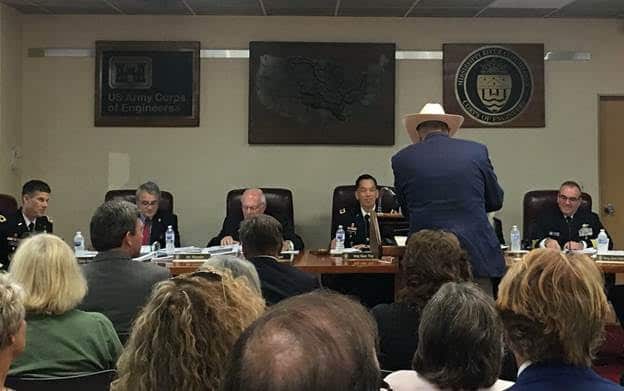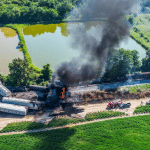Release provided by the Mississippi Department of Agriculture & Commerce
Commissioner of Agriculture and Commerce Andy Gipson addressed the Mississippi River Commission Wednesday at a public hearing in Vicksburg. During his testimony, Gipson outlined the devastating impacts of the flooding along the Mississippi River and the South Delta’s Yazoo Backwater Area. More than one million acres, including 518,000 acres of farmland, were flooded from January to August.
Gipson discussed the impacts felt by the farmers, landowners and residents in the flooded areas. “Flood waters displaced residents, destroyed homes, damaged roads and building infrastructure, and put farmers’ livelihood at stake as much of this year’s crop in the impacted areas could not be planted,” said Gipson. “It will take a significant amount of time and effort to determine the true impact to Mississippi’s economy, forests, marine life, wetlands and wildlife.”
Noting that flooding along the Mississippi River is becoming an annual occurrence, Gipson stressed the need for cooperation among various stakeholders to develop solutions. “The time has come for us to work together in a spirit of mutual collaboration among all stakeholders – Mississippi agriculture, small business, our local communities and counties, and our wildlife enthusiasts,” said Gipson. “I believe that by working together we can find and implement both short term and long term solutions to the obvious systemic failure of the flood control systems along Mississippi’s western boundary and affected inland Delta areas, as well as our Mississippi Gulf Coast.”
Commissioner Gipson called for comprehensive measures to be taken to prevent this catastrophic event in the future, including the completion of the Yazoo Backwater Area pumps. After submitting two letters to the EPA asking that the pumps be reconsidered, he was encouraged by an official response that the EPA plans to continue meeting to review additional data and modeling results that support viable solutions, including a possible reconsideration of their 2008 decision.
“With all Mississippi, I will continue to fight for and to articulate the urgency of this situation to Washington. The bottom line is it’s time to stop talking about the issue. It’s time to finish the pumps,” said Gipson.
Commissioner Gipson’s full remarks are as follows:
Mississippi River Commission Public Hearing Comments of
Andy Gipson, Mississippi Commissioner of Agriculture and Commerce
August 21, 2019
Good morning and thank you for the opportunity to provide these comments to you, the Mississippi River Commission. I come to you today as Commissioner of Agriculture and Commerce on behalf of the State of Mississippi, and of our farmers who are enduring one of the worst farming years in history. I address you on behalf of our Mississippi families, neighbors and small businesses affected by this year’s difficult weather conditions, as well as by the historic flooding along the Mississippi River and the South Delta’s Yazoo Backwater Area. The 2019 Flood has been well documented, and each picture and video is worth a thousand words. Each visual reminder demonstrates the severe and long term impact on not only Mississippi’s farm communities, but on the entire economy and well-being of our State, as well as the devastation to Mississippi wildlife. I ask that you accept my comments today in the spirit in which they are presented. We all know the problems; they have been discussed ad nauseam. The time has come for us to work together in a spirit of mutual collaboration among all stakeholders – Mississippi agriculture, small business, our local communities and counties, and our wildlife enthusiasts. I believe that by working together we can find and implement both short term and long term solutions to the obvious systemic failure of the flood control systems along Mississippi’s western boundary and affected inland Delta areas, as well as our Mississippi Gulf Coast.
Let me start by reminding us all that agriculture is Mississippi’s number one industry, employing approximately 29% of the state’s workforce either directly or indirectly. Agriculture in Mississippi is a 7.72 billion-dollar industry. There are approximately 34,700 farms in the state covering 10.4 million acres.
It is now well documented that significant flooding along the Mississippi River has become an annual event. Depending on which river gauge is examined, significant flooding in Mississippi has occurred in 7 or 8 years out of the past 10 years.
The 2019 Flood had a devastating impact on Mississippi’s agriculture, wildlife and natural resources, with the biggest impact occurring in 9 counties (Adams, Claiborne, Humphreys, Issaquena, Jefferson, Sharkey, Warren, Wilkinson, and Yazoo). These counties lie in areas commonly referred to as the Batture soil region and the Yazoo Backwater Area. Flood waters displaced residents, destroyed homes, damaged road and building infrastructure, and put our farmers’ livelihoods at stake because this year’s crop was not planted. Additionally, the record flood duration negatively impacted forest health and killed many wild animals such as deer, turkey, and raccoons.
This flood has negatively impacted farmers’ personal livelihoods and the livelihoods of rural communities that depend on agriculture to survive. Many rural businesses depend on the daily activities and expenditures of farmers, farm employees, and farm families to stay in business. Support businesses such as seed companies, herbicide companies, and equipment dealers have also been negatively impacted by the loss of farm revenue. This flood event has placed hardship upon farmers that must pay bank loan payments.
Opening of Louisiana’s Bonnet Carre Spillway to relieve flooded areas had a significant negative impact on marine life such as dolphins, sea turtles, oysters, and shrimp. The Mississippi Gulf Coast’s economy is heavily dependent upon the seafood industry, which has been devastated by influx of flood waters into the saltwater ecosystem. Joe Spraggins, Executive Director of the Department of Marine Resources, reported that 80% of this year’s brown shrimp and 60% all shrimp have been negatively impacted by the opening of the Bonnet Carre Spillway.
It will take a significant amount of time and effort to determine the true impact to Mississippi’s economy, forests, marine life, wetlands, and wildlife. Hunting and ecotourism in the affected areas will most certainly be impacted for years to come.
More than 1 million acres of total land flooded from January to August. This included 518,000 acres of farmland. The flood in the Yazoo Backwater Area alone flooded over 550,000 acres including 225,000 acres of farmland plus the entirety of Delta National Forest.
What we do know is Mississippi’s agricultural economy lost a staggering estimated $500 million dollars due to prevented planting alone. Prevented planting is a failure to plant an insured crop with the proper equipment by the final planting date designated in the insurance policy’s Special Provisions or during the late planting period, if applicable.
Mississippi livestock producers had to sell their animals early due to the loss of winter and spring grazing lands. One producer lost over $100,000 because of this single flood event.
Much of the Backwater Flood could have been prevented if the Yazoo Backwater Area Pump Project had been completed as designed. This project was designed and authorized to alleviate backwater flooding and protect the livelihood of area residents and natural resources. However, the United States Environmental Protection Agency (EPA) vetoed the project in 2008, even though it was a federally-authorized U.S. Army Corps of Engineers Civil Works project. This year, based on my personal visits to the areas, I submitted two separate letters to EPA Administrator Andrew Wheeler requesting reconsideration of the EPAs veto of the Yazoo Backwater Pump Project.
This past Friday, August 16th I received an official response from the EPA, assuring me of their active work with the US Army Corps of Engineers on “options to provide flood protection as well as protect wetlands and other important natural resources in the Yazoo Backwater Area,” and that they “plan to continue meeting to review additional data and modeling results that support viable solutions, including a possible reconsideration of our 2008 decision.”
I am encouraged by the EPA’s response letter and trust that this review will continue swiftly and favorably toward the desired goal. With all Mississippi, I will continue to fight for and to articulate the urgency of this situation to Washington. The bottom line is, it’s time to stop talking about the issue. It’s time to #finishthepumps.
The Yazoo Backwater Pumps are a critical component that must be implemented. However, there are other systemic flooding issues that require attention as well, downriver in the Batture Land Area. Last October with then-USACE General Kaiser, I toured significant agricultural and timberland flooding along the Mississippi River south of Vicksburg. My understanding is these lands have remained at flood stage for nearly a full year. We have also been working with the U. S. Army Corps of Engineers and the USDA Risk Management Agency on behalf of Batture Region farmers to identify short-term and long-term solutions to frequent flooding along the Mississippi River. These are issues unique to the Batture areas that will require unique attention and review for long-term solutions.
With more than 1 million acres of farmland and wildlife habitat underwater for 7 months, it will take a significant amount of time, possibly years, to determine the cumulative economic loss regarding homes, crops, livestock, seafood, natural resources, rural businesses, and infrastructure such as roads, bridges, and buildings. I ask that you support comprehensive measures to prevent such a catastrophic event from happening again. As you engage in all these deliberations, I urge you to remember Mississippi’s unified anthem now visible on innumerable banners and social media hashtags – “Finish the Pumps.”
In conclusion, let’s finish the pumps and let’s also explore and implement whatever other comprehensive work remains to be done for the protection of Mississippi’s greatest asset, our people and their livelihoods along the Mississippi River boundary and all affected inland Delta and Coastal areas. In doing so, we will achieve the common interests and well-being of our State, of our Nation, of the Mississippi River, of our wildlife and of the future of Mississippi’s greatest industry, agriculture.








